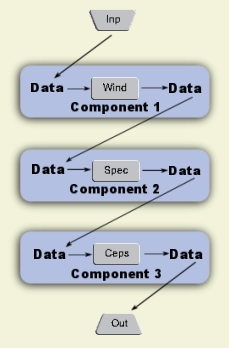3.5.2 MFCC Example:
Enhancements The basic MFCC front end introduced in the previous section can be
enhanced by the use of two additional techniques:
energy normalization
and
cepstral mean subtraction.
In this section, we describe how to implement these using
transform builder. To run the examples described below,
go to the directory $ISIP_TUTORIAL/sections/s03/s03_05_02.
Here you'll see the recip files recipe_mfcc_p1.sof and
recipe_mfcc_p2.sof. These two recipes make up our
standard front end.
The basic MFCC front end introduced in the previous section can be
enhanced by the use of two additional techniques:
energy normalization
and
cepstral mean subtraction.
In this section, we describe how to implement these using
transform builder. To run the examples described below,
go to the directory $ISIP_TUTORIAL/sections/s03/s03_05_02.
Here you'll see the recip files recipe_mfcc_p1.sof and
recipe_mfcc_p2.sof. These two recipes make up our
standard front end.
The first recipe file, recipe_mfcc_p1.sof, can be viewed as an "intermediate" recipe. It computes the maximum energy in the file and saves its value by a Constant object in a file called "max_energy.sof." This recipe also computes the mean cepstrum values needed to generate the CMS-filtered features, and stores these in a file named "mean_cepstrum.sof". The second recipe, recipe_mfcc_p2.sof, uses the output files "max_enerfy.sof" and "mean_cepstrum.sof" from the first recipe to get the maximum enery and the mean cepstrum through constant classes. This completes the feature extraction process. You may use these front-end recipes to extract features with either one of two methods:
Sometimes it is convenient to process raw files directly and transform them into features. You can easily modify recipe files to accomplish this. The files can be modified manually or by using transform builder. To modify the files using transform builder, you must change a few simple parameters in the input block configuration. First, open the file recipe_mfcc_p1.sof. Right click on the input block and click configuration. From this window, open the sub-configuration window by clicking the configure button. Click the audio button to display the audio_input configuration window. Make sure the sample_frequency is set to 8000 and change the file_format to RAW. Click save on all of the configuration windows and return to the transform_builder workspace. Save the file as recipe_mfcc_raw_p1.sof. Repeat these steps for the file recipe_mfcc_p2.sof. To make sure you're files are correct, compare them to these files: recipe_p1_raw_compare.sof and recipe_p2_raw_compare.sof To modify the recipe files manually, open the files in a text editor. Next, find the label @ FrontEnd @. Under this label, you will see two parameters: sample_frequency and file_format. Change these two parameters to the following: sample_frequency = 8000.0; file_format = RAW; Now, save these new files as recipe_mfcc_p1_raw.sof and recipe_mfcc_p2_raw.sof. This is just an alternate way of changing the recipe files without using transform builder. These recipe files can now be used with isip_tranform to process raw files directly, instead of converting the raw files to Sof. See Section 3.4.1 for details about using isip_tranform. For further details on the implementation of this industry-standard front end, see front end laboratory in our on-line workshop notes. |